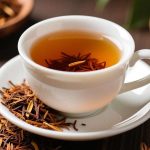Ceylon tea, the world-renowned brew hailing from Sri Lanka, is a favourite for many. But beyond its rich flavour and aroma, a common question arises: how much caffeine are we actually sipping in our daily cup? The answer, like the tea itself, is nuanced and depends on several factors. Let’s delve into the world of Ceylon tea and its caffeine content.
Caffeine Content: A General Overview
Generally, Ceylon tea contains caffeine, but the amounts can vary significantly. Estimates suggest a serving of Ceylon tea can have anywhere from 14 to 61 milligrams of caffeine. Some sources indicate a typical range of 40-70 mg per cup for Ceylon black tea. This is generally less than a standard cup of coffee, which averages around 95 milligrams.
Ceylon Tea Caffeine Compared to Other Beverages:
- Coffee: Ceylon tea generally contains less caffeine than coffee.
- Other Black Teas: Some sources suggest Ceylon black tea might be lower in caffeine than other black teas due to its processing. However, others note its popularity in blends like English Breakfast is due to its caffeine kick.
- Green Tea (General): Ceylon green tea’s caffeine content falls within the general range for green teas (20-45 mg).
Managing Your Caffeine Intake with Ceylon Tea:
If you’re mindful of your caffeine consumption, here are a few tips:
- Opt for Ceylon Green or White Tea: These generally have lower caffeine levels than Ceylon black tea.
- Reduce Steeping Time: A shorter brew will extract less caffeine.
- Use Fewer Tea Leaves: This is a straightforward way to lower the caffeine in your cup.
- Consider Decaffeinated Options: While not entirely caffeine-free, decaffeinated Ceylon tea is available.
- Reusing Tea Leaves: A second infusion of the same tea leaves will typically have lower caffeine content.
Potential Benefits and Concerns:
Caffeine, when consumed in moderation, can offer benefits like increased alertness and metabolism. Ceylon tea itself is rich in antioxidants, which are linked to various health benefits. However, excessive caffeine intake can lead to side effects like anxiety, insomnia, and high blood pressure. It’s particularly important for pregnant women to limit their caffeine intake.
The Bottom Line:
Ceylon tea offers a delightful spectrum of flavours and a moderate caffeine kick, generally lower than coffee. By understanding the different types of Ceylon tea and the factors that influence caffeine, you can choose the perfect brew to suit your preferences and caffeine tolerance. Whether you prefer a robust black tea to start your day or a delicate white tea for a calming afternoon, Ceylon tea provides a versatile and enjoyable experience.





